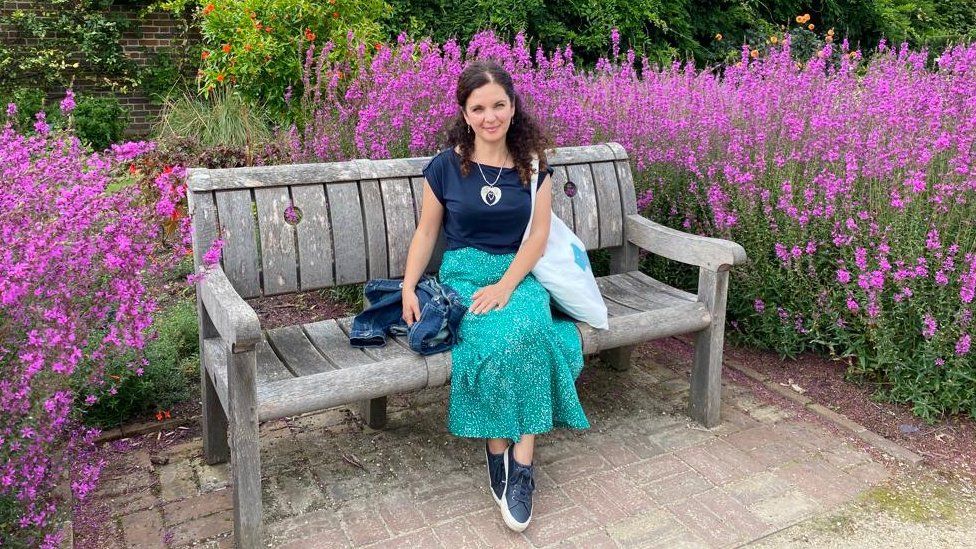ARTICLE AD BOX
 Image source, Helen James
Image source, Helen James
Helen James had never heard of flooding until she experienced it herself and became severely anaemic
By Georgina Davies
BBC Scotland News
Women have called for better education, following their experiences of heavy bleeding in the run-up to menopause.
Helen James was 43 when she became so severely anaemic from menstrual bleeding she needed a blood transfusion.
She said she had never heard of "flooding" until she experienced it and feels more women need to know about the changes to their body in the years before menopause.
"Even though I had always suffered heavy periods, I felt like it came out of the blue," she says.
After several days of heavy bleeding, Helen said she was "really breathless and out of energy" when trying to climb the stairs, but found it difficult to get a doctor's appointment.
She says: "I was so anaemic at that point, tired, and not sleeping because you're having to get out of bed every hour to change tampon and pads.
"I was just in that despair state that I knew I needed help."
Image source, Helen James
Image caption,Helen has become a nutritional therapist since her flooding experience and is "passionate" about sharing knowledge
Helen was finally referred to A&E for a blood transfusion after her blood tests showed extremely low iron levels.
She says she was "thankful" to receive four bags of donated blood.
Helen, who lives in Preston in Lancashire, was also given a high dose of norethisterone, a synthetic form of the hormone progesterone, which stopped her period within 24 hours.
She did not realise at the time she was perimenopausal, the period when a woman's body starts transitioning towards menopause.
"I just thought there was something wrong with me, that the way I worked wasn't working and therefore I was broken.
"I didn't understand and nobody there was talking about it."
Hormonal changes
Helen later got the IUS or hormonal contraceptive coil but decided to have it removed after three years because of "sharp twinges".
By then she had started a degree in nutritional therapy and had learnt about hormonal changes in perimenopause.
Her experience also led to a change in career - from being a management accounts assistant to a nutritionist therapist, working with perimenopausal clients.
She says: "I also try to talk to younger women as well, in their 30s, to expect changes in their late 30s. They might not call it perimenopause but that's when it starts.
"It's sharing knowledge now that I'm really passionate about."
Dr Jacqueline Maybin is a senior research fellow and honorary consultant gynaecologist at the MRC Centre for Reproductive Health in Edinburgh.
She says: "Heavy menstrual bleeding during the perimenopause is common and can be really debilitating."
Problematic menstrual bleeding
It is estimated that up to one in three women will experience abnormal menstruation at some point in their reproductive lives, most commonly when girls start their periods and before menopause.
This might be an underestimate due to the stigma that still surrounds menstruation.
Dr Maybin says: "Problematic menstrual bleeding experienced before menopause is commonly caused by ovulatory dysfunction, an irregular release of eggs from the ovary as the supply of eggs is low.
"This causes disturbance of the reproductive hormones, resulting in irregular, heavy menstrual bleeding."
The Scottish National Blood Transfusion Service confirmed that 175 women in Scotland received a blood transfusion last year due to excessive, frequent and irregular menstruation.
The figure was revealed after a freedom of information (FOI) request by the BBC.
Image source, Kirsty McNeil
Image caption,Kirsty McNeil had to plan to be near a bathroom when she lived with the menopause symptom
Kirsty McNeil, who lives in the southside of Glasgow, first experienced flooding when she was 40 and lived with the symptom for five years.
The 49-year-old says: "I'd always been heavy on the first day of my period but this was just like something else, it was just gushing."
At first she only experienced extreme bleeding on the first few days of her period but it quickly became erratic.
"I had to take time off work sometimes, I had to plan to be near a bathroom", she says.
"Then I suffered with fatigue, my iron levels were going down so there was all that, and there was fainting so in general quite a nightmare to live with and quite debilitating."
When Kirsty approached the doctor she was told she was too young to be menopausal, despite "begging" for her hormones to be tested.
She felt "so angry" to realise she was post-menopausal at 45 or 46 when her periods stopped and says she would like to see "more women opening up" about menopause symptoms.
'Speak to the doctor'
The 2022 Department of Health and Social Care consultative survey on women's health found that fewer than one in 10 women (9%) said they had enough information on the menopause.
Dr Maybin says that menstrual disturbance "usually responds well" to hormonal treatments such as Levonorgestrel intrauterine system or progestogen tablets.
In some cases, surgical treatments can include endometrial ablation (where the lining of the uterus is surgically removed) or a hysterectomy.
Dr Maybin says: "People should speak to their doctor if they have heavy periods that are having a negative impact on their lives or if they experience bleeding between periods, after sex or any bleeding after they have been through the menopause."

 1 year ago
47
1 year ago
47








 English (US) ·
English (US) ·